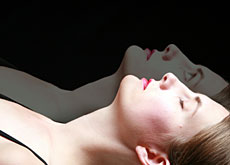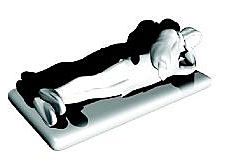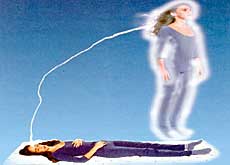Unlocking the mystery of out-of-body experiences

Swiss researchers investigating so-called out-of-body experiences have succeeded in mimicking the phenomenon in healthy people via virtual reality experiments.
They say the technique offers a scientific explanation for sensations that are often thought to be figments of the imagination.
Out-of-body experiences, when a person sees themselves from a location outside their body, have been known to occur when normal brain functioning is disturbed, such as through drug use, epileptic seizures and strokes.
But scientists in Sweden and Switzerland, conducting separate experiments, have now succeeded for the first time in inducing similar illusory experiences in healthy patients. Their results are published in this week’s edition of the journal, Science.
Their findings appear to indicate that the phenomenon results from the brain getting its wires crossed when it processes sensory information such as sight, touch and sound.
“Due to brain damage or due an experimental set-up that tries to trick the brain you can actually disturb this wiring,” Bigna Lenggenhager, a member of the Swiss research team, told swissinfo.
Virtual reality
The team – led by Olaf Blanke, head of the laboratory for cognitive neuroscience at Lausanne’s Federal Institute of Technology – kitted volunteers with virtual reality goggles showing a 3-D image of their own body standing directly in front of them.
They then saw the back of the image stroked with a paintbrush, while someone stroked their own back.
Volunteers were then blindfolded and moved a few steps back. When they were asked to return to their original position, they tended to drift towards where they had seen their virtual bodies standing.
“This shift towards the image shows that the brain somehow fused the visual character and the other sensory input from the subject’s own body, leading to the fact that the subject localised himself outside of his real body,” said Lenggenhager.
She added that vision appeared to dominate other sensory inputs in this situation.
Paranormal phenomenon?
According to the researchers, several subjects said they felt “weird” but none actually reported the disembodiment classically described in an out-of-body experience. Yet they still gravitated towards a position outside their own bodies.
Researchers believe the findings may go some way to removing some of the stigma that patients with neurological disorders feel about these experiences, which are frequently attributed to an active imagination or some sort of paranormal phenomenon.
“Out-of-body experiences and related syndromes are quite common even among healthy subjects and so it helps to explain what is happening,” said Lenggenhager.
Researchers also think the technique could be useful for training people to do precise “teleoperating” tasks, such as performing surgery remotely.
swissinfo, Adam Beaumont
Brain researchers, including Blanke, have shown that the self can be detached from the body and exist on its own, or in other cases felt as a kind of presence.
Earlier research has shown that some brain areas bring together information from several senses. Vision, hearing and touch are processed at first individually, and then combined within another region of the brain to help constitute a person’s complete perception.
Scientists suspect that an area in the right cortex of the brain called the angular gyrus matches up visual information, how the body is seen, and touch and balance sensations that create the mind’s representation of the body. They believe an out-of-body experience may occur when the two do not link up.
Olaf Blanke is head of the laboratory for cognitive neuroscience at Lausanne’s Federal Institute of Technology. It is part of the institution’s Brain-Mind Institute.
His previous work includes research on out-of-body experiences, which can also be created by stimulating a section of the brain.

In compliance with the JTI standards
More: SWI swissinfo.ch certified by the Journalism Trust Initiative


You can find an overview of ongoing debates with our journalists here. Please join us!
If you want to start a conversation about a topic raised in this article or want to report factual errors, email us at english@swissinfo.ch.